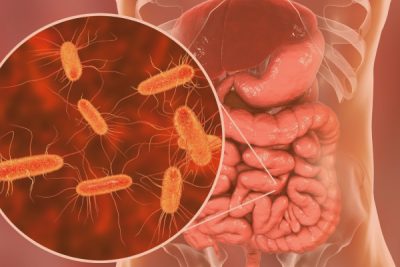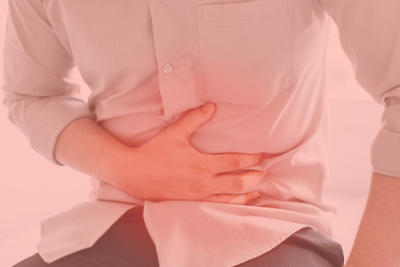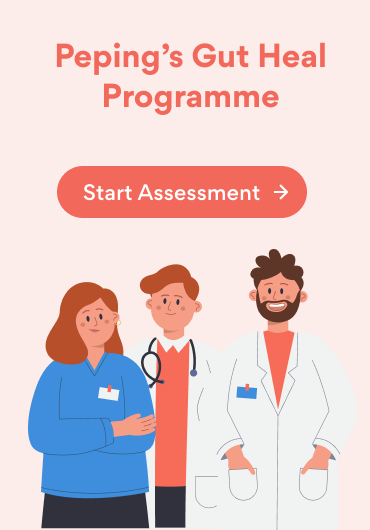Abdomen area covers all the organs linked to the gastrointestinal system and hence abdominal pain is very closely linked to digestive issues. The exact location of the abdominal pain points to different underlying medical issues. In totality abdominal pain covers the pain in the region below the chest and above the pelvis. Understanding the causes and different types of abdominal pain is crucial for recognizing potential underlying conditions and seeking appropriate medical attention.
The nature of the pain is very important to create insight. Pain can be cramp like, sharp or stabbing, intermittent, constant. Each type of pain may signify different underlying causes, including digestive disorders, inflammation, infections, or dysfunction of specific organs.
Identifying the root cause of abdominal pain can be a challenging task, as it can stem from numerous factors. Abdominal Pain also creates a lot of discomfort and often leads to patients struggling with a lot of questions
Explore the top ten most commonly asked questions about abdominal pain and the answers for that
Q: What are the common causes of abdominal pain?
Abdominal pain can be sue to a lot of issues most of which are linked to our digestive system
- Functional Gastric issues: Disorders like IBS, GERD, Indigestion, acid reflux, gastritis, can lead to abdominal discomfort. These conditions often arise due to dietary factors, stress and infections in certain cases. These chronic disorders affect the instestines and cause abdominal pain, bloating, gas and altered bowel habits.
- Gastroenteritis: Commonly known as the stomach flu, gastroenteritis is an inflammation of the stomach and intestines caused by viral or bacterial infections. It results in symptoms such as abdominal pain, nausea, vomiting, diarrhea, and sometimes fever.
- Appendicitis: A sharp pain in the abdomen can at times also be an indication of appendicitis. It occurs when the appendix, a small pouch located in the lower right abdomen, becomes inflamed..
- Gallstones: When substances in the bile, such as cholesterol or bilirubin, harden into stones, they can cause severe abdominal pain, especially in the upper right abdomen.
Q: When should I seek medical attention for abdominal pain?
Prompt evaluation for abdominal pain. If the pain is slight and temporary then generally it is not a cause of big worry. Lets lookat the different cases of the pain
- Severe or persistent pain: If the pain is intense, unbearable, or lasts for an extended period, it may signify a more serious underlying condition that requires medical attention. If the pain is sharp and temporary it might be a case of mild gastritis. However, generally it is always good to check with a doctor if the pain is persistent.
- Abdominal pain accompanied by other symptoms: If the pain is clubbed with other symptoms. If there are symptoms like blood in stoold, black colored stools, diffulty in breathing, then it is better to see a doctor immediately.
- Abdominal pain during pregnancy: Pregnant women experiencing abdominal pain should consult their healthcare provider promptly, as it can indicate conditions like ectopic pregnancy, miscarriage, or preterm labor.
- Pain after an injury or accident: If the pain happens after an injury it is must to consult a doctor. It could be due to some internal damage or internal bleeding.
Remember, it’s always better to err on the side of caution and seek medical advice when in doubt. A healthcare professional can assess your symptoms, perform necessary tests, and provide appropriate guidance and treatment.
Q: Can stress or anxiety contribute to abdominal pain?
Stress can be a major factor in contribution to abdominal pain. When stress or anxiety is experienced, the brain triggers the release of stress hormones, such as cortisol, which can affect the functioning of the digestive system. These hormones can lead to increased sensitivity of the gut. It can lead to increased stomach acid production as well. Additionally, stress can disrupt the balance of the gut microbiota, which plays a crucial role in maintaining gut health.
Stress can also lead to hypersensitivity which can further lead to bloating, gas and abdominal pain
Stress can also trigger IBS which can lead to severe bloating, gastritis and abdominal pain
Q: What are some home remedies for relieving mild abdominal pain?
Home remedies might provide temporary relief, here are a few that might be useful
- Heat application: Applying a heat pad generally provides relief from the abdomen pain. Heat application is very useful in relieving pain from cramps.
- Herbal teas: Certain herbal teas, such as peppermint or chamomile, have been traditionally used to soothe digestive discomfort. They can help relax the muscles of the gastrointestinal tract and relieve bloating and gas.
- Ginger: Ginger tea works wonders. It contains anti-inflammatory properties and provides quite a bit of relief from pain and nausea.
- Probiotics: Probiotics are beneficial bacteria that can support gut health. They can be found in fermented foods like curd. Adding probiotics to your diet may help regulate digestion and reduce abdominal discomfort.
- Gentle exercise: Engaging in light physical activity, such as walking or stretching, can stimulate digestion and alleviate abdominal pain. However, avoid strenuous exercise when experiencing pain, as it may exacerbate symptoms.
Remember, these home remedies are intended for mild, occasional abdominal pain.
Q: What tests or diagnostic procedures are used to determine the cause of abdominal pain?
The specific tests and diagnostic procedures used may vary depending on the suspected underlying condition.
- A doctor will start with sme physical examination, palpating the abdomen and checking for signs of tenderness, inflammation, or organ enlargement.
- Common blood tests for abdominal pain may include a complete blood count (CBC), liver function tests, amylase and lipase levels (for pancreatic disorders), and C-reactive protein (CRP) to assess inflammation.
- Imagines tests like ultrasound, X-ray, Computed Technology, MRI are widely used to assess cases of abdomen pain at times. These tests can be used to detect obstructions, perforations, or the presence of calcifications, such as kidney stones.They can help identify conditions such as appendicitis, diverticulitis, or tumors. These tests can also be used to diagnose conditions such as liver or pancreatic disease.
- Upper endoscopy (esophagogastroduodenoscopy, or EGD) allows for the examination of the esophagus, stomach, and upper part of the small intestine. A colonoscopy enables visualization of the colon and rectum, assisting in the detection of conditions like inflammatory bowel disease (IBD), polyps, or colorectal cancer.
Q: Are there specific dietary changes that can help alleviate abdominal pain?
- The low-FODMAP diet is often prescribed for individuals with irritable bowel syndrome (IBS). The diet reduces the intake of certain carbohydrates which are not easily digestible and are fermented in the gut causing bloating, gas and abdominal pain.
- Identification of trigger foods and removal them from the diet can also reduce the gastric problems and abdomen pain along with it.
- Fiber-rich diet: Fibre is extremely important for a healthy digestive system. A diet rich in fibre improves digestion and reduces the chances of abdomen pain
- Small, frequent meals: Consuming smaller, more frequent meals rather than large, heavy meals can help prevent excessive strain on the digestive system and reduce the likelihood of abdominal discomfort.
- Hydration: Maintaining proper hydration is crucial for overall digestive health. Drinking an adequate amount of water can help promote regular bowel movements and prevent constipation, which can contribute to abdominal pain.
Q: Can certain medications cause abdominal pain?
A lot of medications have abdominal pain as a side effect
- Non-steroidal anti-inflammatory drugs such as ibuprofen and naproxen are used to reduce inflammation and pain. However, they can irritate the lining of the stomach and small intestine, leading to abdominal pain, indigestion, and even ulcers with long-term use or at higher doses.
- Antibiotics which are used widely can cause gastrointestinal side effects, including abdominal pain, nausea, and diarrhea. These effects are often due to disruptions in the natural balance of gut bacteria.
- Chemotherapy drugs: Certain chemotherapy medications used to treat cancer can cause abdominal pain as a side effect. This may be due to direct irritation of the gastrointestinal lining or other systemic effects.
Q: How can lifestyle factors contribute to abdominal pain?
Lifestyle factors have a huge role to play in abdomen pain
- Diet high in processed foods, spicy foods, fatty foods and low in fibre can cause abdomen pain. Also a diet consisting of trigger foods such as milk, coffee, tea in respective cases can cause abdomen pain.
- Lack of exercise is a cause for abdominal pain. Active lifestyle keeps the digestive system moving and reduces the chances of pain drastically.
- Stress is a major factor contributing towards pain. Stress directly impacts the digestive system and stressful triggers cause abdominal pain
- Smoking and alcohol are a major factor in causing abdominal pain. They both irritate the stomach lining a lot and cause a lot of pain.
- Inadequate sleep or disrupted sleep patterns can affect digestion and contribute to abdominal discomfort. It’s important to prioritize healthy sleep habits and ensure sufficient restorative sleep.
Q: Can menstrual periods cause abdominal pain?
Here are some key types of menstrual abdominal pain:
- Primary dysmenorrhea: This is the most common type of menstrual cramps and occurs in the absence of any underlying medical condition. It typically starts a day or two before menstruation and lasts for a few days. The pain is often described as cramping and may be accompanied by lower back pain and discomfort.
- Secondary dysmenorrhea: In some cases, menstrual cramps may be a result of an underlying medical condition, such as endometriosis, adenomyosis, or pelvic inflammatory disease. Secondary dysmenorrhea tends to be more severe and may require medical evaluation and treatment.
Applying heat to the lower abdomen, practicing relaxation techniques, and maintaining a healthy lifestyle with regular exercise and a balanced diet can reduce pain during menstruation.
Q: Can abdominal pain be a symptom of a heart-related issue?
A few heart related condition might feel like an abdomen pain
- Angina is chest pain or discomfort caused by reduced blood flow to the heart muscle. In some cases, individuals may experience referred pain to the upper abdomen or even the lower chest, mimicking abdominal pain.
- Myocardial infarction (Heart Attack): During a heart attack, the blockage of blood flow to the heart can cause chest pain or pressure. However, in some cases, the pain can radiate to the upper abdomen, jaw, or arms, creating a sensation of abdominal pain. In this case it is important to understand that the pain is being triggered from chest and is important to seek help immediately
- Aortic dissection is a serious condition involving a tear in the wall of the aorta, the large artery that carries blood from the heart. The pain associated with an aortic dissection can sometimes be felt in the abdomen, resembling abdominal pain.
Conclusion
In conclusion, abdominal pain is a common symptom that can have various causes and implications. Throughout this article, we have addressed some of the most frequently asked questions about abdominal pain, providing insights into its gastrointestinal context, different types, and associated factors.
Overall, the management of abdominal pain requires a comprehensive approach that takes into account the individual’s medical history, symptoms, and potential underlying conditions. It is always advisable to consult with a healthcare professional for an accurate diagnosis and appropriate treatment.













